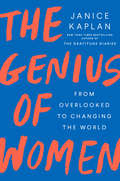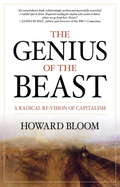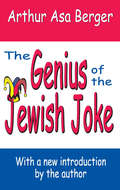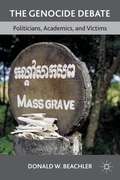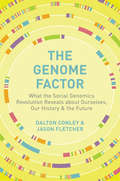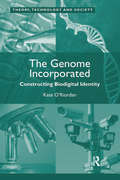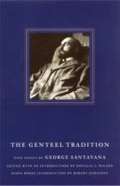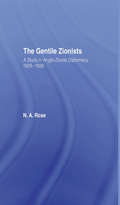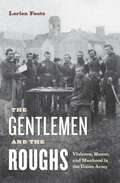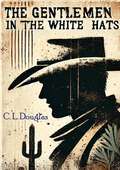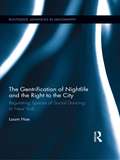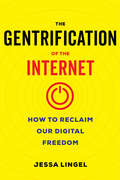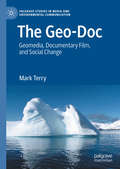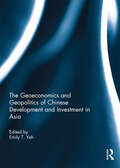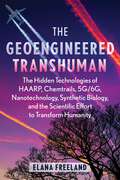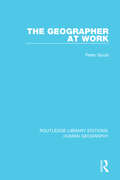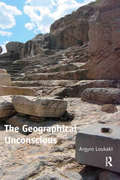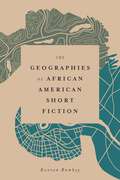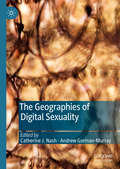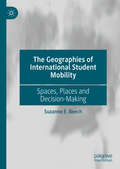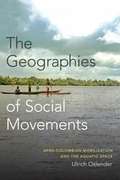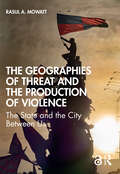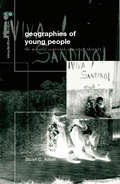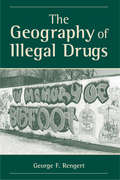- Table View
- List View
The Genius of Women: From Overlooked to Changing the World
by Janice KaplanWe tell girls that they can be anything, so why do 90 percent of Americans believe that geniuses are almost always men? New York Times bestselling journalist Janice Kaplan explores the powerful forces that have rigged the system—and celebrates the women geniuses past and present who have triumphed anyway. Even in this time of rethinking women&’s roles, we define genius almost exclusively through male achievement. When asked to name a genius, people mention Albert Einstein, Leonardo da Vinci, and Steve Jobs. As for great women? In one survey, the only female genius anyone listed was Marie Curie. Janice Kaplan, the New York Times bestselling author of The Gratitude Diaries, set out to determine why the extraordinary work of so many women has been brushed aside. Using her unique mix of memoir, narrative, and inspiration, she makes surprising discoveries about women geniuses now and throughout history, in fields from music to robotics. Through interviews with neuroscientists, psychologists, and dozens of women geniuses at work in the world today—including Nobel Prize winner Frances Arnold and AI expert Fei-Fei Li—she proves that genius isn't just about talent. It's about having that talent recognized, nurtured, and celebrated. Across the generations, even when they face less-than-perfect circumstances, women geniuses have created brilliant and original work. In The Genius of Women, you&’ll learn how they ignored obstacles and broke down seemingly unshakable barriers. The geniuses in this moving, powerful, and very entertaining book provide more than inspiration—they offer a clear blueprint to everyone who wants to find her own path and move forward with passion.
The Genius of the Beast: A Radical Re-vision of Capitalism
by Howard BloomIs global capitalism on its last legs? Is the era of American leadership over? Has the West begun a decline into a new Dark Age? Does American civilization deserve to survive? These are the unnerving questions raised by the Great Crash of 2009. This book resents a radically new answer, insisting that global society has only begun to realize its full potential. Bloom argues that there's a hidden mandate beneath the surface of capitalism: "It's struggling to whisper and rumble its message to you and me. That hidden imperative can lift us from economic crisis, can make us a leader in the next-generation economy, and can dramatically upgrade our ability to empower our fellow human beings." Bloom sees crisis as opportunity, opportunity for the whole human race. In more than eighty short, fast chapters, insights appear suddenly, like the quick bursts of flashbulbs, taking the reader on a sweeping tour of human history, from the Stone Age to the present. Every chapter conveys a radically new way to see the astonishing mechanism we call "Western Civilization." Author Howard Bloom marvels at how humans have turned toxic waste into food and fuel, trash into treasure, and garbage into gold. He shows how we've produced material miracles based on immaterial things--passion, persistence, and fantasy. He shows that what many regard as the end is just the beginning. The beginning of something you've never before imagined. The author explains why the secret to capitalism's next great leap does not lie in new financial tricks, but in tapping things right under our noses in radically new ways--that is, tapping our imagination, our desire to feel useful, our desire to help others, and our desire to be recognized for contributing to the welfare of humanity. The key to next-generation capitalism lies in a big-picture view that's utterly unlike anything you've previously perceived. A big-picture view that will startle you. A big-picture view with which you can ignite the world, get a new handle on your life, and help transform society. This brilliant, inspirational work of daring ideas and breath-taking research offers more than hope. It offers unseen levels of understanding. Understanding that can literally redefine what it means to be a human being.
The Genius of the Jewish Joke
by Arthur Asa BergerThe Genius of the Jewish Joke focuses on what is distinctive and unusual about Jewish jokes and Jewish humor. Jewish humor is humor by Jews and about Jews, in whatever medium this humor is found. Jokes are defined as short stories, meant to amuse, with a punch line, though Jewish humor exists in many other forms—riddles, comic definitions, parodies—as well. The book makes a "radical" suggestion about the origin of Jewish humor—namely, that Sarah and Abraham's relation to God, and the name of their son Isaac (which, in Hebrew, means laughter), recognizes a special affinity in Jews for humor. Abraham does not sacrifice Isaac (humor) and, thus, humor and the Jews are linked early in Jewish history.Berger discusses techniques of humor and how they can be used to analyze jokes. He also compares "Old World Jewish Humor"—the humor of the shtetl, with its fabulous schlemiels, schlimazels, schnorrers, and other characters—and "New World Humor"—the humor of Jewish doctors, lawyers, accountants, and other professional types living mostly in the suburbs nowadays. Jewish humor is contrasted with other forms of ethnic humor, such as Polish jokes and Italian American jokes.This humor, in addition to providing pleasure, reveals a great deal about Jewish character and culture and, in addition, the human condition. Now available with a new introduction by the author, The Genius of the Jewish Joke is an entertaining and informative inquiry into Jewish humor that explores its distinctiveness, its unique spirit, and its role in Jewish identity.
The Genocide Debate
by Donald W. BeachlerNeither a case study of a particular genocide nor a work of comparative genocide, this book explores the political constraints and imperatives that motivate debates about genocide in the academic world and, to a lesser extent, in the political arena. The book is an analysis of the ways that political interests shape discourse about genocide.
The Genome Factor: What the Social Genomics Revolution Reveals about Ourselves, Our History, and the Future
by Dalton Conley Jason FletcherFor a century, social scientists have avoided genetics like the plague. But the nature-nurture wars are over. In the past decade, a small but intrepid group of economists, political scientists, and sociologists have harnessed the genomics revolution to paint a more complete picture of human social life than ever before. The Genome Factor describes the latest astonishing discoveries being made at the scientific frontier where genomics and the social sciences intersect.The Genome Factor reveals that there are real genetic differences by racial ancestry—but ones that don't conform to what we call black, white, or Latino. Genes explain a significant share of who gets ahead in society and who does not, but instead of giving rise to a genotocracy, genes often act as engines of mobility that counter social disadvantage. An increasing number of us are marrying partners with similar education levels as ourselves, but genetically speaking, humans are mixing it up more than ever before with respect to mating and reproduction. These are just a few of the many findings presented in this illuminating and entertaining book, which also tackles controversial topics such as genetically personalized education and the future of reproduction in a world where more and more of us are taking advantage of cheap genotyping services like 23andMe to find out what our genes may hold in store for ourselves and our children.The Genome Factor shows how genomics is transforming the social sciences—and how social scientists are integrating both nature and nurture into a unified, comprehensive understanding of human behavior at both the individual and society-wide levels.
The Genome Incorporated: Constructing Biodigital Identity (Theory, Technology and Society)
by Kate O'RiordanThe Genome Incorporated examines the proliferation of human genomics across contemporary media cultures. It explores questions about what it means for a technoscience to thoroughly saturate everyday life, and places the interrogation of the science/media relationship at the heart of this enquiry. The book develops a number of case studies in the mediation and consumption of genomics, including: the emergence of new direct-to-the-consumer bioinformatics companies; the mundane propagation of testing and genetic information through lifestyle television programming; and public and private engagements with art and science institutions and events. Through these novel sites, this book examines the proliferating circuits of production and consumption of genetic information and theorizes this as a process of incorporation. Its wide-ranging case studies ensure its appeal to readers across the social sciences.
The Genteel Tradition: Nine Essays
by George SantayanaThe nine essays are: Young Sammy's first wild oats, The genteel tradition in American philosophy, Shakespeare: made in America, Genteel American poetry, The moral background, Philosophical opinion in America, Materialism and idealism in America, Marginal notes on civilization in the United States, and The genteel tradition at bay. Includes bibliographical references and index.
The Gentile Zionists: A Study in Anglo-Zionist Diplomacy 1929-1939
by N.A. RoseFirst Published in 1973. Routledge is an imprint of Taylor & Francis, an informa company.
The Gentlemen and the Roughs: Violence, Honor, and Manhood in the Union Army
by Lorien Foote&“A seminal work&” on class divisions within the Union Army—&“One of the best examples of . . . scholarship on the social history of Civil War soldiers&” (The Journal of Southern History). During the Civil War, the Union army appeared cohesive enough to withstand four years of grueling war against the Confederates and to claim victory in 1865. But fractiousness bubbled below the surface of the North&’s presumably united front. Internal fissures were rife within the Union army: class divisions, regional antagonisms, ideological differences, and conflicting personalities all distracted the army from quelling the Southern rebellion. In this highly original contribution to Civil War and gender history, Lorien Foote reveals that these internal battles were fought against the backdrop of manhood. Clashing ideals of manliness produced myriad conflicts, as when educated, refined, and wealthy officers (&“gentlemen&”) found themselves commanding a hard-drinking group of fighters (&“roughs&”)—a dynamic that often resulted in violence and even death. Based on extensive research into previously ignored primary sources, The Gentlemen and the Roughs uncovers holes in our understanding of the men who fought the Civil War and the society that produced them. Finalist for the 2011 Gilder Lehrman Lincoln Prize
The Gentlemen in the White Hats: Dramatic Episodes in the History of the Texas Rangers
by C. L. DouglasThe Gentlemen in the White Hats by C. L. Douglas is a thrilling and richly detailed exploration of the legendary Texas Rangers, one of the most iconic law enforcement organizations in American history. Through vivid storytelling and meticulous research, Douglas brings to life the dramatic episodes, fearless characters, and enduring legacy of the Rangers, whose exploits have become the stuff of myth and folklore.From their formation in the early 19th century to their role in taming the lawless frontier, the Texas Rangers are portrayed as both protectors and warriors, navigating the complex and often violent challenges of the American Southwest. Douglas recounts their daring confrontations with outlaws, cattle rustlers, and renegades, as well as their involvement in pivotal historical moments, such as the battles along the U.S.-Mexico border and the fight against notorious criminals.The book highlights the colorful personalities of individual Rangers, whose bravery and resourcefulness epitomized the rugged spirit of the frontier. At the same time, Douglas offers a balanced perspective, addressing the controversies and challenges the Rangers faced, including their methods and the evolving nature of their role in a rapidly changing society.Rich with action, historical context, and larger-than-life characters, The Gentlemen in the White Hats captures the essence of the Texas Rangers as symbols of justice, resilience, and the enduring spirit of the American West. Douglas’s engaging prose and attention to detail make this a must-read for history enthusiasts, fans of Western lore, and anyone fascinated by the intersection of fact and legend in the shaping of American history.Perfect for readers who appreciate gripping tales of adventure and historical significance, this book offers an unforgettable journey into the dramatic and often dangerous world of the Texas Rangers.
The Gentrification Reader
by Loretta Lees Tom Slater Elvin WylyThis reader brings together the classic writings and contemporary literature that has helped to define the field of Gentrification, changed the direction of how it is studied and illustrated the points of conflict and consensus that are distinctive of gentrification research.
The Gentrification of Nightlife and the Right to the City: Regulating Spaces of Social Dancing in New York (Routledge Advances in Geography)
by Laam HaeIn The Gentrification of Nightlife and the Right to the City, Hae explores how nightlife in New York City, long associated with various subcultures of social dancing, has been recently transformed as the city has undergone the gentrification of its space and the post-industrialization of its economy and society. This book offers a detailed analysis of the conflicts emerging between newly transplanted middle-class populations and different sectors of nightlife actors, and how these conflicts have led the NYC government to enforce “Quality of Life” policing over nightlife businesses. In particular, it provides a deep investigation of the zoning regulations that the municipal government has employed to control where certain types of nightlife can or cannot be located. Hae demonstrates the ways in which these struggles over nightlife have led to the “gentrification of nightlife,” while infringing on urban inhabitants’ rights of access to spaces of diverse urban subcultures – their “right to the city.” The author also connects these struggles to the widely documented phenomenon of the increasing militarization of social life and space in contemporary cities, and the right to the city movements that have emerged in response. The story presented here involves dynamic and often contradictory interactions between different anti/pro-nightlife actors, illustrating what “actually existing” gentrification and post-industrialization looks like, and providing an urgent example for experts in related fields to consider as part of a re-theorization of gentrification and post-industrialization.
The Gentrification of the Internet: How to Reclaim Our Digital Freedom
by Jessa LingelHow we lost control of the internet—and how to win it back. The internet has become a battleground. Although it was unlikely to live up to the hype and hopes of the 1990s, only the most skeptical cynics could have predicted the World Wide Web as we know it today: commercial, isolating, and full of, even fueled by, bias. This was not inevitable. The Gentrification of the Internet argues that much like our cities, the internet has become gentrified, dominated by the interests of business and capital rather than the interests of the people who use it. Jessa Lingel uses the politics and debates of gentrification to diagnose the massive, systemic problems blighting our contemporary internet: erosions of privacy and individual ownership, small businesses wiped out by wealthy corporations, the ubiquitous paywall. But there are still steps we can take to reclaim the heady possibilities of the early internet. Lingel outlines actions that internet activists and everyday users can take to defend and secure more protections for the individual and to carve out more spaces of freedom for the people—not businesses—online.
The Geo-Doc: Geomedia, Documentary Film, and Social Change (Palgrave Studies in Media and Environmental Communication)
by Mark TerryThis book introduces a new form of documentary film: the Geo-Doc, designed to maximize the influential power of the documentary film as an agent of social change. By combining the proven methods and approaches as evidenced through historical, theoretical, digital, and ecocritical investigations with the unique affordances of Geographic Information System technology, a dynamic new documentary form emerges, one tested in the field with the United Nations. This book begins with an overview of the history of the documentary film with attention given to how it evolved as an instrument of social change. It examines theories surrounding mobilizing the documentary film as a communication tool between filmmakers and policymakers. Ecocinema and its semiotic storytelling techniques are also explored for their unique approaches in audience engagement. The proven methods identified throughout the book are combined with the spatial and temporal affordances provided by GIS technology to create the Geo-Doc, a new tool for the activist documentarian.
The Geoeconomics and Geopolitics of Chinese Development and Investment in Asia
by Emily T. YehThe recent launching of China’s high profile Belt and Road Initiative and its founding of the Asian Infrastructure Investment Bank have underscored China’s rapidly growing importance as a global player in development, diplomacy, and economic governance. To date, scholarship on "China abroad" has focused primarily on Africa and Latin America. In comparison, China’s investment and development assistance among its neighbors in Asia have been understudied, despite the fact that China’s aid and overseas investment remain concentrated in Asia, the countries of which have had complex and often fraught cultural and political relationships with China for more than a millennia. Through case studies from Southeast Asia, South Asia, and Central Asia, this volume provides a targeted examination of the intertwined geoeconomics and geopolitics of China’s investment and development in Asia. It provides in-depth and grounded analyses of nationalisms and state-making projects, as well as the material effects of China’s "going out" strategy on livelihoods, economies, and politics. The volume contributes to understandings of what characterizes Chinese development, and pays attention to questions of elite agency, capitalist dynamics, state sovereignty, the politics of identity, and the reconfiguration of the Chinese state. The chapters in this article originally appeared in a special issue of Eurasian Geography and Economics.
The Geoengineered Transhuman: The Hidden Technologies of HAARP, Chemtrails, 5G/6G, Nanotechnology, Synthetic Biology, and the Scientific Effort to Transform Humanity
by Elana Freeland• Explores how chemicals and nanotechnology are being continuously delivered via chemtrail aerosols by jets, drones, and rockets in the guise of &“climate change&”• Examines the public-private partnerships behind transhumanism, including Big Pharma, GMO agribusiness, DARPA/IARPA, corporations, and foundations• Reveals the reality of the secret space program (SSP) and the planetary &“smart grid&” of 5G/6G, the Internet of Things (IoT), and artificial intelligence (AI)What if the degradation of the planet is not just a byproduct of human greed but the explicit intention of government agencies bought off by corporations? What if their intent is to create a "post-human" global government run by AI, populated by a genetically and electromagnetically altered Homo sapiens loaded with nanotechnology and run by 5G/6G/7G transceivers from space?Building on decades of research, Elana Freeland offers a comprehensive exposé of the transhumanist agenda—the transformation of humanity into a slave class by means of biotechnology, genetic engineering, molecular nanotechnology, and artificial intelligence. She reveals that weather control is already a global reality thanks to the aerosol chemtrails that maintain the ionized atmosphere needed for a myriad of military and civilian wireless operations. The air we breathe, the soil we grow our food in, and the water we drink have all been altered away from Nature and toward a synthetic "metaverse." Meanwhile, Big Pharma injects nano-sized hardware and software in vivo that activate a transhumanist brain-computer interface with AI. The author also examines the public-private partnerships behind transhumanism and reveals the reality of the secret space program and the planetary "smart grid" of 5G/6G.The eons-old dream of global power seems to be coming of age in this overwhelmingly technological era of domination by the wealthy. And yet by exposing the transhumanist agenda and studying the technology being employed to subjugate the human race, we have the opportunity to find ways not just to resist becoming machines ourselves but to utilize our technologies for restoring a high civilization in service to the Good, the Beautiful, and the True.
The Geographer at Work (Routledge Library Editions: Human Geography #8)
by Peter GouldThis book charts the developments in the discipline of geography from the 1950s to the 1980s, examining how geography now connects with urban, regional and national planning, and impacts on areas such as medicine, transport, agricultural development and electoral reform. The book also discusses how technical and theoretical advancements have generated a renewed sense of philosophic reflection – a concern closely linked with the critical examination and development of social theory.
The Geographical Unconscious
by Argyro LoukakiThis ambitious and innovative volume stretches over time and space, over the history of modernity in relation to antiquity, between East and West, to offer insights into what the author terms the 'geographical unconscious.' She argues that, by tapping into this, we can contribute towards the reinstatement of some kind of morality and justice in today's troubled world. Approaching selected moments from ancient times to the present of Greek cultural and aesthetic geographies on the basis of a wide range of sources, the book examines diachronic spatiotemporal flows, some of which are mainly cultural, others urban or landscape-related, in conjunction with parallel currents of change and key issues of our time in the West more generally, but also in the East. In doing so, The Geographical Unconscious reflects on visual and spatial perceptions through the ages; it re-considers selective affinities plus differences and identifies enduring age-old themes, while stressing the deep ancient wisdom, the disregarded relevance of the aesthetic, and the unity between human senses, nature, and space. The analysis provides new insights towards the spatial complexities of the current age, the idea of Europe, of the East, the West, and their interrelations, as well as the notion of modernity.
The Geographies of African American Short Fiction (Margaret Walker Alexander Series in African American Studies)
by Kenton RambsyPerhaps the brevity of short fiction accounts for the relatively scant attention devoted to it by scholars, who have historically concentrated on longer prose narratives. The Geographies of African American Short Fiction seeks to fill this gap by analyzing the ways African American short story writers plotted a diverse range of characters across multiple locations—small towns, a famous metropolis, city sidewalks, a rural wooded area, apartment buildings, a pond, a general store, a prison, and more. In the process, these writers highlighted the extents to which places and spaces shaped or situated racial representations. Presenting African American short story writers as cultural cartographers, author Kenton Rambsy documents the variety of geographical references within their short stories to show how these authors make cultural spaces integral to their artwork and inscribe their stories with layered and resonant social histories. The history of these short stories also documents the circulation of compositions across dozens of literary collections for nearly a century. Anthology editors solidified the significance of a core group of short story authors including James Baldwin, Toni Cade Bambara, Charles Chesnutt, Ralph Ellison, Zora Neale Hurston, and Richard Wright. Using quantitative information and an extensive literary dataset, The Geographies of African American Short Fiction explores how editorial practices shaped the canon of African American short fiction.
The Geographies of Digital Sexuality
by Catherine J. Nash Andrew Gorman-MurrayThis edited book engages with the rapidly emerging field of the geographies of digital sexualities, that is, the interlinkages between sexual lives, material and virtual geographies and digital practices. Modern life is increasingly characterised by our integrated engagement in digital/material landscapes activities and our intimate life online can no longer be conceptualised as discrete from ‘real life.’ Our digital lives are experienced as a material embeddedness in the spaces of everyday life marking the complex integration of real and digital geographies. Perhaps nowhere is this clearer than in the ways that our social and sexual practices such as dating or casual sex are bound up online and online geographies and in many cases constitute specific sexuality-based communities crossing the digital/material divide. The aim of this collection is to explore the complexities of these newly constituted and interwoven sexual and gender landscapes through empirical, theoretical and conceptual engagements through wide-ranging, innovative and original research in a new and quickly moving field.
The Geographies of International Student Mobility: Spaces, Places and Decision-Making
by Suzanne E. BeechThis book offers critical insights into the geographies of the international student higher education experience from initial recruitment, through to the plethora of personal factors which influence their decisions to become mobile and experiences when abroad. From the student perspective these include, but are not limited to, the importance of social networks, desire for a multicultural experience and the attraction to certain locations as discussed in this volume. However, unlike other work, it also reflects on the motivations of the HEIs themselves and their need to continue recruiting students in the face of greater competition from overseas. Recognising this omission, this book also analyses the resulting migration industries and how these are sustained (and even necessitated) by the sector. It is, therefore, the first to bring together these wider institutional narratives with those of the students resulting in a holistic and comprehensive insight into the student mobility process.
The Geographies of Social Movements: Afro-Colombian Mobilization and the Aquatic Space
by Ulrich OslenderIn The Geographies of Social Movements Ulrich Oslender proposes a critical place perspective to examine the activism of black communities in the lowland rain forest of Colombia's Pacific Coast region. Drawing on extensive ethnographic fieldwork in and around the town of Guapi, Oslender examines how the work of local community councils, which have organized around newly granted ethnic and land rights since the early 1990s, is anchored to space and place. Exploring how residents' social relationships are entangled with the region's rivers, streams, swamps, rain, and tides, Oslender argues that this "aquatic space"--his conceptualization of the mutually constitutive relationships between people and their rain forest environment--provides a local epistemology that has shaped the political process. Oslender demonstrates that social mobilization among Colombia's Pacific Coast black communities is best understood as emerging out of their place-based identity and environmental imaginaries. He argues that the critical place perspective proposed accounts more fully for the multiple, multiscalar, rooted, and networked experiences within social movements.
The Geographies of Threat and the Production of Violence: The State and the City Between Us
by Rasul A MowattThe Geographies of Threat and the Production of Violence exposes the spatial processes of racialising, gendering, and classifying populations through the encoded urban infrastructure – from highways cleaving neighbourhoods to laws and policies fortifying even more unbreachable boundaries. This synthesis of narrative and theory resurrects neglected episodes of state violence and reveals how the built environment continues to enable it today within a range of cities throughout the world. Examples and discussions pull from colonial pasts and presents, of old strategic settlements turned major modern cities in the United States and elsewhere that link to the physical and legal structures concentrating a populace into neighbourhoods that prep them for a lifetime of conscripted and carceral service to the State.
The Geographies of Young People: The Morally Contested Spaces of Identity (Critical Geographies)
by Stuart C AitkenThe Geographies of Young People traces the changing scientific and societal notions of what it is to be a young person, and argues that there is a need to rethink how we view childhood spaces, child development and the politics of growing up.This book brings coherency to the growing field of children's geographies by arguing that although most of it does not prescribe solutions to the moral assault against young people, it nonetheless offers appropriate insights into difference and diversity, and how young people are constructed.Other books in the series:Culture/Place/Health (forthcoming)Seduction of Place (forthcoming)Celtic Geographies (forthcoming) TimespaceBodiesMind and Body SpacesChildren's GeographiesLeisure/Tourism GeographiesThinking SpaceGeopolitical TraditionsEmbodied GeographiesAnimal Spaces, Beastly PlacesCloset SpaceClubbingDe-centering SexualitiesEntanglements of Power.
The Geography Of Illegal Drugs
by George F RengertThe nightly news and other media provide a constant reminder of illegal drug transport over American borders and along routes between various U.S. cities. The general public is well aware that law enforcement efforts to address the foreign supply and trafficking of illegal drugs into the United States is an ongoing battle.This useful and readable compendium gives a fascinating account of how illegal drugs are transported into and around the United States and throughout its neighborhoods. Criminologist and geographer George F. Rengert takes a unique approach to the problem of illegal drug distribution and U.S. drug markets. Using maps and charts to illustrate his findings, Rengert applies spacial diffusion models to the illegal drug trade and explains why certain drugs are transported and found in different parts of the country. For example, the highest concentration of marijuana plants is not on either coast, but rather across the middle of the United States?throughout what is known as the corn belt. At the local level Rengert assesses the patterns and processes that interconnect drug sales and neighborhood deterioration and change.The book also addresses the important issues of how illegal drugs in this country operate on wholesale and retail levels and ways in which law enforcement at the federal, state, and local levels contend with this widespread problem. Using ethnographic material to provide real-life examples, Rengert explores how drug dealers on the street expand spatially and predictably in their neighborhoods. He illustrates how this knowledge helps law enforcement in efforts to get these drugs off the streets.
